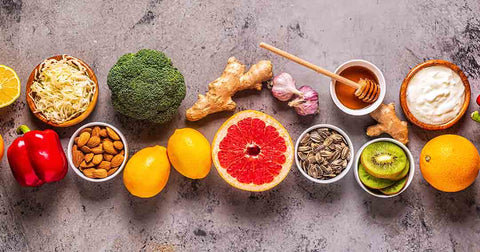Hormone imbalance is said to occur when there is too much or too little of a hormone in the body. Hormones are biological compounds secreted by endocrine glands that regulate various functions of the body, including metabolism and reproduction. There are certain healthy lifestyle measures, including foods for hormone balance.
Hormonal fluctuation occurs naturally in the body. Hormone levels naturally rise and fall throughout your life. Certain periods of life can result in dramatic fluctuations in hormone levels, such as puberty, pregnancy, and menopause. Hormone imbalance has been increasing due to the lifestyle habits and diet that we follow.
So, in the article, we have discussed certain foods for hormone balance. These foods prevent hormonal imbalance and can also be used as therapy for hormonal imbalance.
Foods for Hormone Balance
Nutrition can be a good way to address hormonal imbalances. Here is a list of 15 foods that help balance hormones:
Cruciferous vegetables
 Some common examples of cruciferous vegetables are cabbage, cauliflower, broccoli, kale, radish, and Brussels sprouts.
Some common examples of cruciferous vegetables are cabbage, cauliflower, broccoli, kale, radish, and Brussels sprouts.
These vegetables contain a compound called indole-3-carbinol, which promotes the function of the liver. The proper functioning of the liver is crucial for hormonal balance because the liver is involved with the metabolism of hormones and the hormone levels in the bloodstream. So, these vegetables rich in indole-3-carbinol should be part of your daily diet for hormonal balance.
High protein foods
 Protein must be part of your daily diet for proper functioning and hormonal balance. It is recommended to take 20 to 30 grams of protein at every meal. This can be obtained by eating high protein-containing foods such as eggs, chicken breast, lentils, and fish.
Protein must be part of your daily diet for proper functioning and hormonal balance. It is recommended to take 20 to 30 grams of protein at every meal. This can be obtained by eating high protein-containing foods such as eggs, chicken breast, lentils, and fish.
There are certain amino acids called essential amino acids, which are not synthesized in our body and can only be obtained from foods rich in protein. These amino acids are the building blocks of certain hormones called peptide hormones. Peptide hormones play an important role in various physiological processes of the body, such as growth, energy metabolism, appetite, stress, and reproduction.
So, eating sufficient protein-rich foods for hormonal balance is important to maintain the proper functioning of the body.
Foods with healthy fats
 There are various types of healthy fats that, when included in the diet, reduce insulin resistance and appetite.
There are various types of healthy fats that, when included in the diet, reduce insulin resistance and appetite.
One of them is medium-chained triglycerides. These fatty acids are less likely to be stored as fat tissue and more likely to be used by the liver for energy and to burn calories. Additionally, medium-chained triglycerides also reduce insulin resistance and regulate blood sugar levels.
Similarly. omega- 3 fatty acid is another healthy fat that reduces inflammation and pro-inflammatory markers. Thus, it promotes insulin sensitivity and also protects the heart and brain from heart attack and stroke, respectively.
Examples of such foods rich in healthy fats are olive oil, coconut oil, fatty fish, avocado, almonds, peanuts, and hazelnuts.
Foods that improve gut health
 Gut health is an important part of hormonal balance. Our gut has many good and bad microorganisms, and a high number of good bacteria is required to maintain gut health. The good bacteria reduces insulin resistance and also helps in weight loss by regulating appetite-controlling hormones.
Gut health is an important part of hormonal balance. Our gut has many good and bad microorganisms, and a high number of good bacteria is required to maintain gut health. The good bacteria reduces insulin resistance and also helps in weight loss by regulating appetite-controlling hormones.
Some of the foods that increase the number of good bacteria in the gut and improve gut health are fermented foods like kefir, yogurt, kimchi, kombucha, olives, and fermented vegetables. Similarly, prebiotics like whole grains, bananas, greens, onions, garlic, soybeans, and artichokes also induce the growth and activity of beneficial microorganisms.
High fiber diet

Fiber is an essential part of our diet. It increases insulin sensitivity and regulates appetite. Additionally, a fiber-rich diet also improves gut health, which is important to maintaining hormonal balance. Fibers also regulate bowel habits and inhibit the absorption of unwanted toxins in our bodies.
Some foods rich in fiber are pears, avocados, apples, bananas, carrots, beets, broccoli, brussel sprouts, kale, spinach, kidney beans, split peas, chickpeas, oats, corn, almonds, walnuts, and fresh coconuts.
Flaxseeds
Flaxseeds are a good dietary source of lignans. Lignans are a type of phytoestrogen that promotes estrogen and thus regulates estrogen levels in our body. It also helps the body get rid of estrogen metabolites. The condition where there can be estrogen deficiency is menopause, which can cause symptoms such as hot flashes, night sweats, and irritability.
So, involving flaxseeds in your diet regularly helps to get rid of the symptoms associated with estrogen deficiency during the perimenopausal period.
Whole fruits
Involving whole fruits, with their skins, in your regular diet helps maintain hormonal balance. However, it is better to choose fruits low in sugar and high in fiber, such as apples, pears, berries, and citrus. Fruit juice can increase blood sugar levels, so it should not be preferred.
So, you should consider including a portion of whole fruits in your daily diet.
Herbs and spices
There are different herbs and spices that help in maintaining hormonal balance. They have anti-inflammatory properties, which are useful to prevent autoimmune disorders associated with glandular pathologies, such as diabetes mellitus, autoimmune thyroid disorders, and autoimmune adrenal disorders. Some common herbs and spices with such properties are ginger, turmeric, paprika, and garlic.
Magnesium-rich foods

Magnesium is a mineral that helps with improving insulin sensitivity and regulating blood glucose levels. It is also helpful with PMS (premenstrual syndrome) and symptoms associated with the polycystic ovarian syndrome (PCOS). So, if you are suffering from the conditions mentioned, you should consider including magnesium-containing foods in your diet. Furthermore, magnesium also regulates the level of the stress hormone, secreted by the adrenal gland.
Some magnesium-rich foods worth considering are:
- Green leafy vegetables like spinach, watercress, and kale.
- Avocados
- Legumes like chickpeas, lentils, and beans
- Tofu
- Nuts like almonds and cashew nuts
- Seeds of sunflower and pumpkin seeds.
- Wholegrains
Almonds
Almonds act as a good dietary source in the regulation of blood sugar levels. It can eventually lower the likelihood of getting type II diabetes mellitus. They also help in reducing bad cholesterol in the body. However, due to their high-calorie content, you must consume almonds in moderation.
Almonds are highly nutritious as they provide a good amount of healthy fat, fiber, protein, and minerals such as magnesium. All of these nutritional values are important to maintain hormonal balance.
Avocado
Avocados help to decrease the absorption of estrogen. They contain key plant sterols that can reduce excess estrogen. This allows increased progesterone to be present in women and testosterone in men.
Additionally, avocados are rich in healthy fats and fiber, which are beneficial for heart health and maintaining overall hormonal balance. You should consider consuming one-fourth of an avocado per day regularly.
Broccoli
Broccoli has a significant value in maintaining hormonal balance. It promotes liver function and helps in liver detoxification pathways. Since hormones are metabolized mostly in the liver, it regulates hormone metabolism and thus maintains hormonal balance. Additionally, it also provides essential minerals required for hormone synthesis and function.
Green tea
Green tea has many nutritional benefits, which makes it suitable for regular consumption. Green tea contains theanine, which reduces the release of cortisol. Cortisol is a stress hormone. Thus, green tea regulates hormonal balance.
Additionally, it also has anti-inflammatory properties, which reduce inflammation and various hormonal imbalances associated with inflammation.
Eggs
Eggs provide a good source of choline, a compound required for the formation of the neurotransmitter acetylcholine. Acetylcholine regulates the activity of the nervous system and various signaling pathways, which is useful for brain health and regulating hormonal activity.
Eggs are also rich in healthy fats such as omega-3 fatty acids, which have anti-inflammatory properties. Antiinflammatory property is useful for improving insulin sensitivity and preventing autoimmune conditions associated with hormonal imbalance.
Thus, by improving brain health and reducing inflammation, eggs help in maintaining hormonal harmony. Eggs are also a good source of amino acids required for hormone synthesis.
Pumpkin seeds
Pumpkin seeds are a good source of magnesium. Magnesium works alongside vitamin B5 and vitamin C to regulate the function of the adrenal glands and helps the body fight stressful conditions. Any stressful situation lowers the magnesium level in our body. Pumpkin seeds are a good source for replenishing those magnesium levels. Additionally, it also regulates blood sugar levels by reducing insulin resistance.
Thus, it is important to regularly consume pumpkin seeds in our diet to improve magnesium levels and maintain hormonal balance.
Final insights
Hormones are compounds secreted by endocrine glands in our body that are required for the proper functioning of the body. They are involved in regulating and processing various functions. So, an imbalance in hormone levels can affect body functions and lead to various disease conditions.
There are certain lifestyle modifications that can be made to maintain hormone balance. Among lifestyle advice, diet and foods for hormone balance are effective methods of achieving it. Foods for hormone balance can provide various vitamins, minerals, and nutrients that help regulate hormonal metabolism.
Foods with a good amount of protein, healthy fat, fiber, magnesium, and antioxidants should be included in your regular diet to help maintain hormone balance and overall health.
Watch AFIL test kits testimonial videos click here
Sources
- Naveed, S., Ghayas, S., & Hameed, A. (2015). Hormonal imbalance and its causes in young females. Journal of Innovations in Pharmaceuticals and Biological Sciences, 2(1), 12-13.
- Bell, V., Ferrão, J., Pimentel, L., Pintado, M., & Fernandes, T. (2018). One health, fermented foods, and gut microbiota. Foods, 7(12), 195.
- MacKendrick, N. A., & Troxel, H. (2022). Like a finely-oiled machine: SELF-HELP and the elusive goal of HORMONE BALANCE. Social Science & Medicine, 115242.
- Sale, S. The Complete Hormone-Balancing Nutrition Plan.
- Levin, N. E. Now Foods Indole-3-Carbinol (I3C) 200 mg-60 Veg Capsules.
- Make, B. Foods to Nourish Your Body During Menopause.


.png?v=1737390083)
.png?v=1737187409)


